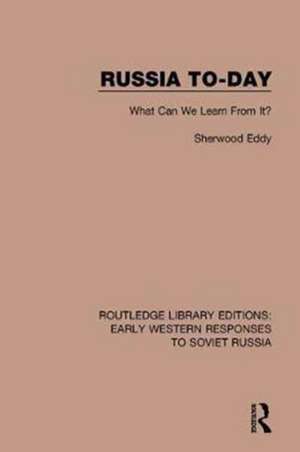Russia To-Day: What Can We Learn From It?: RLE: Early Western Responses to Soviet Russia
Autor Sherwood Eddyen Limba Engleză Hardback – 29 iun 2017
Din seria RLE: Early Western Responses to Soviet Russia
- 34%
 Preț: 9198.24 lei
Preț: 9198.24 lei - 34%
 Preț: 708.55 lei
Preț: 708.55 lei - 34%
 Preț: 680.73 lei
Preț: 680.73 lei - 34%
 Preț: 680.73 lei
Preț: 680.73 lei -
 Preț: 323.23 lei
Preț: 323.23 lei - 34%
 Preț: 680.73 lei
Preț: 680.73 lei - 34%
 Preț: 680.73 lei
Preț: 680.73 lei - 34%
 Preț: 596.40 lei
Preț: 596.40 lei - 34%
 Preț: 764.20 lei
Preț: 764.20 lei - 34%
 Preț: 597.20 lei
Preț: 597.20 lei - 34%
 Preț: 680.73 lei
Preț: 680.73 lei - 34%
 Preț: 708.55 lei
Preț: 708.55 lei - 39%
 Preț: 680.73 lei
Preț: 680.73 lei - 34%
 Preț: 680.73 lei
Preț: 680.73 lei - 34%
 Preț: 680.73 lei
Preț: 680.73 lei
Preț: 708.55 lei
Preț vechi: 1112.20 lei
-36% Nou
Puncte Express: 1063
Preț estimativ în valută:
135.60€ • 141.04$ • 111.94£
135.60€ • 141.04$ • 111.94£
Carte tipărită la comandă
Livrare economică 14-28 aprilie
Preluare comenzi: 021 569.72.76
Specificații
ISBN-13: 9781138071070
ISBN-10: 1138071072
Pagini: 336
Dimensiuni: 156 x 234 x 24 mm
Greutate: 0.45 kg
Ediția:1
Editura: Taylor & Francis
Colecția Routledge
Seria RLE: Early Western Responses to Soviet Russia
Locul publicării:Oxford, United Kingdom
ISBN-10: 1138071072
Pagini: 336
Dimensiuni: 156 x 234 x 24 mm
Greutate: 0.45 kg
Ediția:1
Editura: Taylor & Francis
Colecția Routledge
Seria RLE: Early Western Responses to Soviet Russia
Locul publicării:Oxford, United Kingdom
Public țintă
General, Postgraduate, and UndergraduateCuprins
Part 1: The Warning of Russia's Evils 1. Bureaucracy and the Denial of Liberty 2. Violence and Compulsion 3. Dogmatism, Atheism and Anti-Religion Part 2: Possible Contributions to Human Welfare 1. Social Justice and Social Planning 2. A Classless Society 3. The Treatment of Criminals 4. The Care of Children: Youth and Education 5. New Motives and Incentives 6. Eliminating Unemployment and Slum Clearance 7. The Revolution in Agriculture 8. The New Morality 9. A Unified Philosophy of Life 10. The Reformation of Religion 11. The Interpretation of History. Appendix I: Marx and the Communist Manifesto. Appendix II: The Jewish Problem
Descriere
Originally published in 1934, this book was the result of an extensive knowledge of Russia, based on many visits under the Czarist regime and the Bolshevik government. Choosing his own interpreters, the author interviewed friends and foes of the government, Russians and foreigners, in all walks of life. The book discusses the commerical, political and religious trends of early 20th Century Russia, as well as bureaucracy, state-sanctioned violence and the lack of intellectual freedom.
